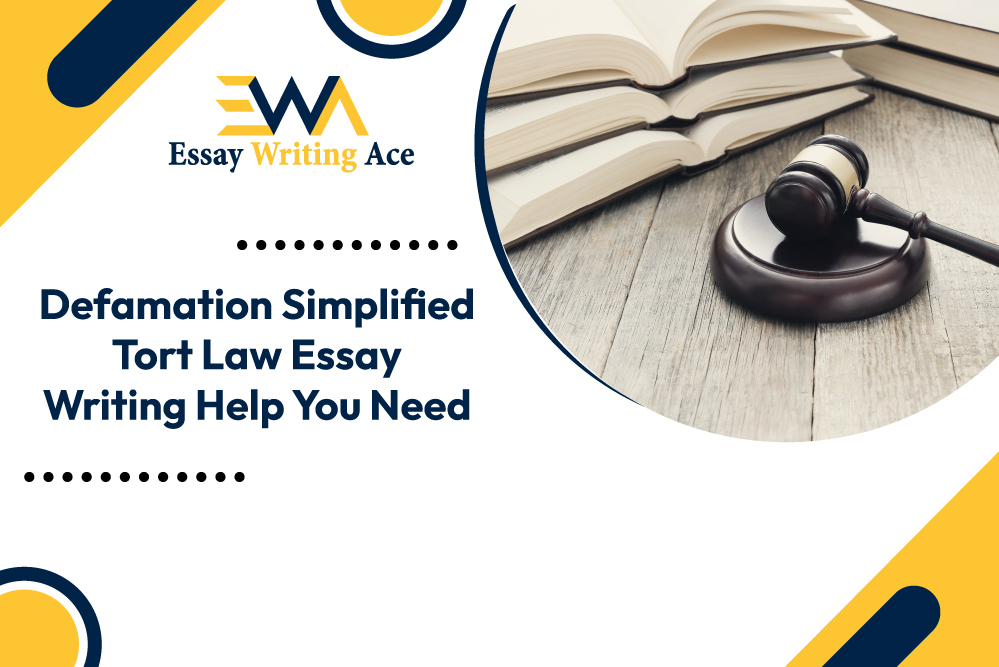In the energetic and complicated world of law, tort law occupies a pivotal position. It governs civil wrongs. It ensures justice for those harmed by others. Among the branches of tort law, defamation law is complex and highly relevant in today’s digital age and has got utmost importance. Writing an essay on tort law, especially on defamation, requires a deep knowledge of the law and its real-world application. Let’s explore how to simplify defamation law. Also, how do law students find tort law essay writing service useful?
Understanding Defamation: The Tort of Reputation
The law of Defamation deals with actions that harm a person’s reputation with false statements and allegations. It is categorized into several main groups:
- Libel is defamation in a permanent form, usually written or published.
- Slander: Temporary or spoken defamation.
Both categories need to prove key elements:
- False Statement: The statement must be untrue.
- Someone must communicate it to a third party.
- Harm: It must result in reputational damage or harm to the plaintiff.
Yet, distinguishing between opinions and defamatory statements often blurs these lines. It becomes a challenging area for students to dissect essays.
Why Tort Law Essays Are Complex
Writing an essay on defamation under tort law involves navigating:
- Doctrinal challenges: Legal doctrines like malice and qualified privilege need a nuanced analysis.
- Case Law Application: Understanding precedent cases like New York Times Co. v. Sullivan (1964) and Reynolds v. Times Newspapers Ltd. is essential for demonstrating critical thinking.
- Defamation laws vary greatly between countries and even among states. We need a comparative approach.
Simplifying Tort Law Principles through Essay-Writing Services
A tort law essay writing service can turn complex legal issues into clear insights. Here’s how they help:
- Breaking down complex doctrines
Experienced legal writers simplify doctrines like “actual malice” and “innocent dissemination” in online defamation cases involving public figures. These explanations clarify the law and add examples to the essay.
- Real-world Applications
It is necessary to apply defamation principles in today’s issues, like social media disputes. Writing services provide new insights into courts’ use of defamation law on tweets, blogs, and other digital content.
- Incorporating Recent Developments
Staying updated on recent rulings, such as the UK’s 2013 Defamation Act, or changes in US online defamation liability, keeps essays engaging.
- Structuring and Formatting
Tort law essays demand precision. Writing services help present arguments. They use the IRAC method (Issue, Rule, Application, and Conclusion) and citation standards, like OSCOLA and Bluebook.
Key Challenges in Writing Defamation Essays
- Interpreting Statutory Provisions
Let’s include the Laws like the UK’s Defamation Act or Section 230 of the US Communications Decency Act is an intimidating. Essay services provide tailored explanations to demystify these laws.
- Balancing Theory and Practice
Essays should bridge the gap between academic theory and practical implications. Writing services utilize landmark cases and hypothetical scenarios to achieve this balance.
- Navigating Ethical Dilemmas
Defamation law often intersects with freedom of speech, raising ethical concerns. Essay writers highlight these debates, helping students craft arguments that reflect critical thinking.
Why Choose Tort Law Essay Writing Service?
Expertise in legal research
Professional services use legal experts. They research statutes, analyze case law, and combine info.
Customized Help
The team tailors each essay to meet the student’s academic needs. This includes drafting an outline, reviewing a draft, or delivering a polished essay.
Time-Saving Solution
With rigorous coursework, students often face tight deadlines. Essay writing services offer timely solutions without compromising quality.
Plagiarism-Free Content
Reputable services ensure their work is original. This is vital for academic integrity in legal essays.
The Relevance of Defamation Law Today
In today’s digital-first era, defamation law has gained renewed significance.
- Social Media Challenges: Platforms like Twitter and Facebook are rife with defamation claims.
- Cyber Defamation: Anonymity online complicates tracing defamatory statements to their sources.
- AI-Generated Content: The rise of generative AI raises new questions. Who is accountable for defamatory statements made by its algorithms?
Essay writing services help students understand new issues. This ensures that their work is both modern and thorough.
Our Thought
Defamation law, as a part of tort law, demands meticulous understanding and analysis. Writing essays on this topic often feels like navigating a legal labyrinth. But, with professional essay writing help, students can tackle complex ideas with confidence. They can include recent developments and produce standout essays.
These services connect theory with practice. They ensure that tort law essays are not assignments. Instead, they are deep explorations of the law’s evolving landscape.
FAQs
-
What are the primary defenses against defamation claims?
Common defenses include:
- Truth (justification): Proving that the statement is true.
- Privilege: Statements made in certain contexts, like parliamentary debates, are immune.
- Fair comment: Honest opinion on matters of public interest.
-
How can students improve their tort law essays?
- Focus on case law and statutes.
- Use IRAC for structured arguments.
- Seek professional feedback from essay services.
-
Not possible to remove the adverb.
Yes. Laws like Section 230 give U.S. intermediaries, like social media, immunity. This complicates liability.
-
Why is “actual malice” significant?
It sets a high bar for public figures to prove defamation. They must show intent to harm or a reckless disregard for the truth.
-
How do essay writing services ensure quality?
They use legal experts, ensure adherence to academic standards, and provide personalized help.
-
What recent trends impact defamation law?
Emerging issues include AI-generated defamatory content and evolving interpretations of cyber defamation statutes.

